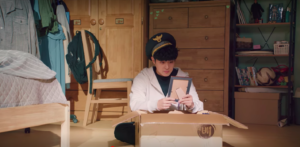
In recent years, cable channel OCN has produced a steady line-up of more of the same thing—gritty dramas that are a cross between mystery, crime, and fantasy. In fact, all three of its five releases this year center on hard-hitting police detectives who fight against all odds to uphold truth and justice in their respective communities.
At first glance, their latest offering doesn’t seem all that different. The Uncanny Counter has all the elements of a typical OCN series—it’s fast-paced, action-packed, and though it may not have a cop as a protagonist, it does follow the son of one. Somewhere along the line, however, the channel must’ve picked up the need for variety, because The Uncanny Counter, as the title suggests, is quite the standout.
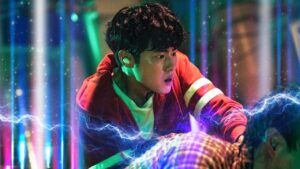
For starters, it presents itself through the eyes of a much younger and spirited character—a high schooler, to be exact. So-mun, played by first-time lead Jo Byung-gyu (Sky Castle), instantly brightens the usually tough genre with his youth and charm. He is remarkable in this regard, but what really makes the show distinct from the usual fare is its ability to constantly and smoothly transition into multiple genres. What begins as a formulaic action story quickly evolves into a clever mash-up of fantasy, thriller, comedy, and mystery.
It’s an exciting premise to be sure—with a nationwide viewership share of 7.65%, it is currently OCN’s highest-rated series—but if the latest episodes are anything to go by, it would seem that the ambitious drama is now aiming to tackle even more. Specifically, it’s taking a shot at the philosophical as it increasingly questions what it means to be human.
The Uncanny Counter may just be six episodes in, but it has already demonstrated skilled, deft balance. As it begins to play with more profound ideas on morals and ethics, the question has to be asked: can it continue to juggle many things at once, or will it topple over in excess, as a lot of K-dramas are wont to do? To understand its chances, it might help to first learn how it built its rich and vibrant world.
As mentioned, The Uncanny Counter is mostly centered around So-mun, a teenager who lost his detective parents in a car crash. He’s left with a limp and fierce longing for surrogate parents, which he finds in his best friends, his grandparents, and eventually in his fellow “counters” Ga Mo-tak (Yu Jun-Sang), Chu Mae-ok (Yum Hye-Ran), and Do Ha-na (Gugudan‘s Sejeong). As a result of joining the counters—a group of half-human grim reapers who hunt down demons that have escaped the afterlife—he now bears the immense responsibility of saving his loved ones and the human race at large with his superhuman powers and discerning heart of gold.

At the start of the series, only one major genre stands out: superhero. Things are played out simply and animatedly, almost to comic-book effect. So-mun is reminiscent of Tom Holland’s Peter Parker—loyal, kind, and eager as he looks after his grandparents, helps a stranger on the street, and works on a webtoon with his friends. His fellow counters, meanwhile, are more of the classic hero type. When we first meet them, they’re dashing from their cover-up noodle bar to the whereabouts of a mysteriously powerful demon (Ji Cheong-Shin, played by Lee Hong-Nae). Ha-na reads the demon’s mind, Mo-tak attacks with unparalleled strength, and they’re both treated with Mae-ok’s healing abilities. Their actions pop, the sound effects boom, and as they lose this round, Cheong-Shin laughs a hearty, villainous laugh. It’s all textbook superhero, impressively so, and as it establishes this solid foundation, it smoothly brings in another major genre: crime.
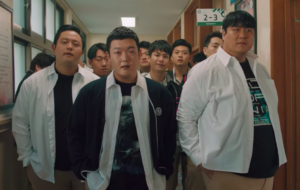
When So-mun asks Mo-tak why counters live in Jungjin of all places, he learns that this is because it is a “sinful” city rife with greed and corruption, making it a refuge for evil spirits and effectively switching the show’s “Spider-Man” references to “Batman.” We first get a sense of this when we see the bullying that goes in So-mun’s high school. Even by K-drama standards, the violence here is horrifying, with the gang members beating kids to a pulp if they don’t hand over their school money (though admittedly, this is slightly blunted by the hilarious fact that the “teenagers” are played by burly men in their 30s). The bullies are backed by influential businessmen and political bigwigs, who in turn, are protected by the police they pay with more than just taxes. As if that unholy trinity isn’t bad enough, they’re also joined by the escaped demons who possess them and feed on their innate wickedness.
At this point, along with being a classic superhero tale and a layered crime story, it is also a terrifying thriller. Thanks to director Yoo Seon-dong’s horror chops, the evil spirits are properly fearsome, with their scenes serving some of the most exciting and frightening moments of the show. All the while, Mo-tak’s detective past naturally draws us into the police world without feeling far removed from the counter-world, establishing an intense and serious mood of mystery. The grimness is offset with the heartwarming, family-like dynamic between the counters, who are enamored, if not inspired, by the innocence of their maknae So-mun. So-mun’s fresh eyes also serve as our proxy into this strange and fascinating world.
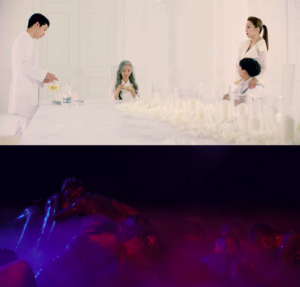
It’s an impressive balancing act, and the premise is pretty hefty as it is, but here’s where it gets tricky. One of the biggest themes running through all these genres is the emphasis on good and evil. The afterlife guardians are good—they make sure everything is in order, going so far as to hire human counters to catch escaped demons—while the demons, of course, are bad. They murder innocent people and inspire wickedness wherever and whenever possible. This moral situation may seem uncharacteristically simplistic for the show, which up until then has favored the complex, but this black-and-white-take actually hints at something more profound and philosophical as it raises a fundamental question: what does it really mean to be good? Is it actually as binary as these angels and demons suggest?
When So-mun first witnesses a demon attack, he’s taken aback by his colleagues’ violence and cruelty. If counters are only after the demons that possess a human body, why do they have to hurt the person hosting the spirit as well? Ha-na assures So-mun that the human hosts are already “evil to begin with,” but what does this say about free will? This reasoning seems to suggest that humans are predestined to be either good or evil all their lives, with no in-between and no shot at change.
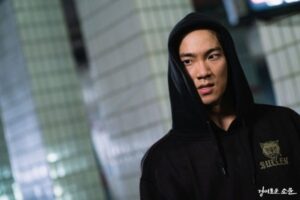
Thankfully, this notion is challenged by the characterization of Cheong-shin, the show’s chilling villain. The Uncanny Counter takes great pains to show how he evolved into the bloodthirsty, psychokinetic third-level demon that he is. It is revealed that he is the bastard son of a crook, and he was and continues to be brutally used and abused by his father. Despite Cheong-shin’s eagerness to please, he was never actually taken care of or loved, so he is emotionally and mentally stunted. Even with all the dark power he possesses, he still stays by his father’s side, waiting for the acceptance that he can’t fathom will never come. Of course, this doesn’t excuse his vile deeds, but it does contextualize them.
On their part, the counters aren’t all that clean either. The afterlife guardians give them a strict rule—never interfere with human affairs—yet time and again, they find themselves breaking this rule because of its impossibility. Mo-tak, in particular, plans to learn more about his killer presumably to exact revenge, and even their righteous leader Ms. Chu is having trouble justifying why he shouldn’t do this. “We’re still human,” Mo-tak mutters and this seems to be reason enough for his colleagues to silently encourage him. So-mun also harbors his own anger issues and finds it difficult to stop beating his enemies to near-death. Humans are ultimately fallible, the show seems to suggest, and you’d have to be divine to avoid its greatest pitfalls.
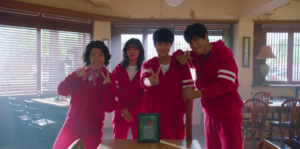
Now, these aren’t major points in the show yet. Rightfully busy with its world-building, it has only started to tackle morality, albeit lightly and carefully, in the last episode. As of now, this possible subversion of good and evil is still just a promise, but it’s exciting nonetheless. If it gets this right, it could elevate an already fun and complex drama into a profound commentary on what it is to be human, especially in our modern, dog-eat-dog society. In the Gotham-like city of Jungjin, a microcosm of the world at large, it would be interesting to see how our heroes learn to be good on their own terms.
Balance is key here, which the show has already proved it does well. If it maintains its steady direction and seamless shifts, it will have plenty of room to welcome another weighty theme into its exciting world. The first episodes set up a lot of room for future events, so here’s hoping it makes good use of that space.
(Naver. Images via Netflix and OCN)


